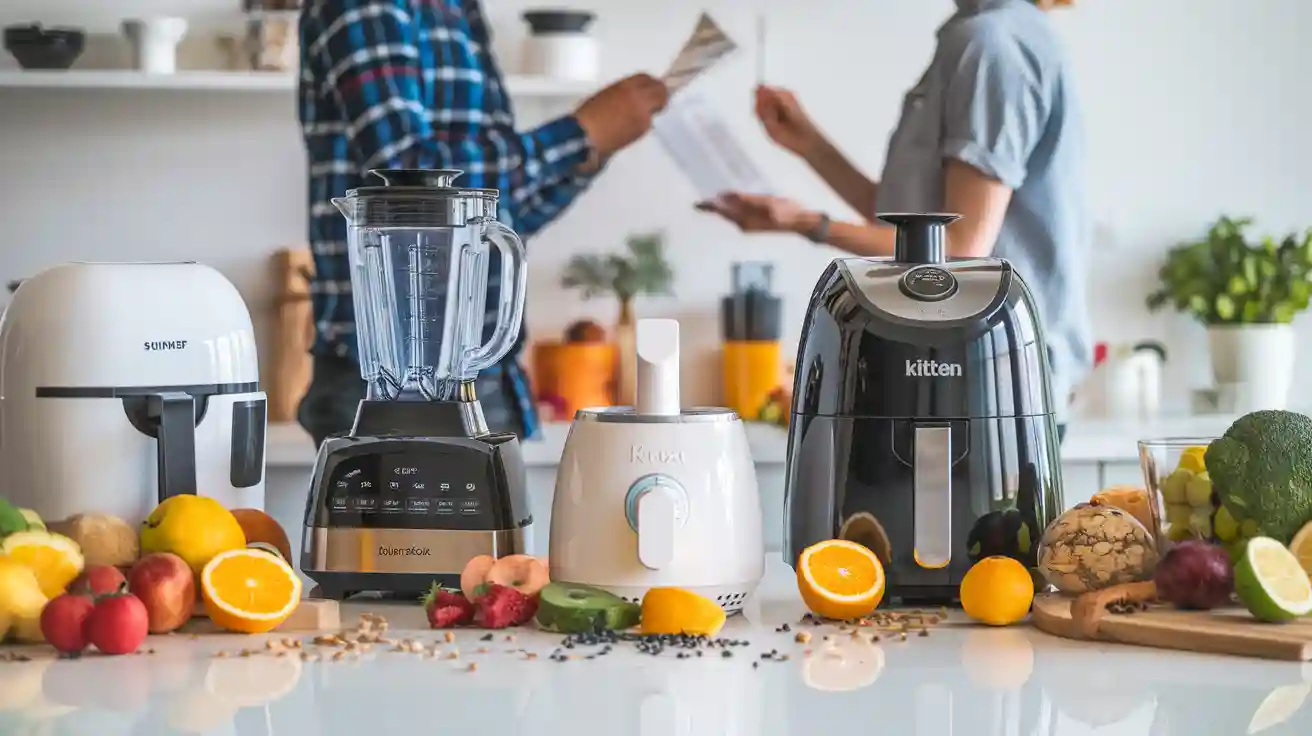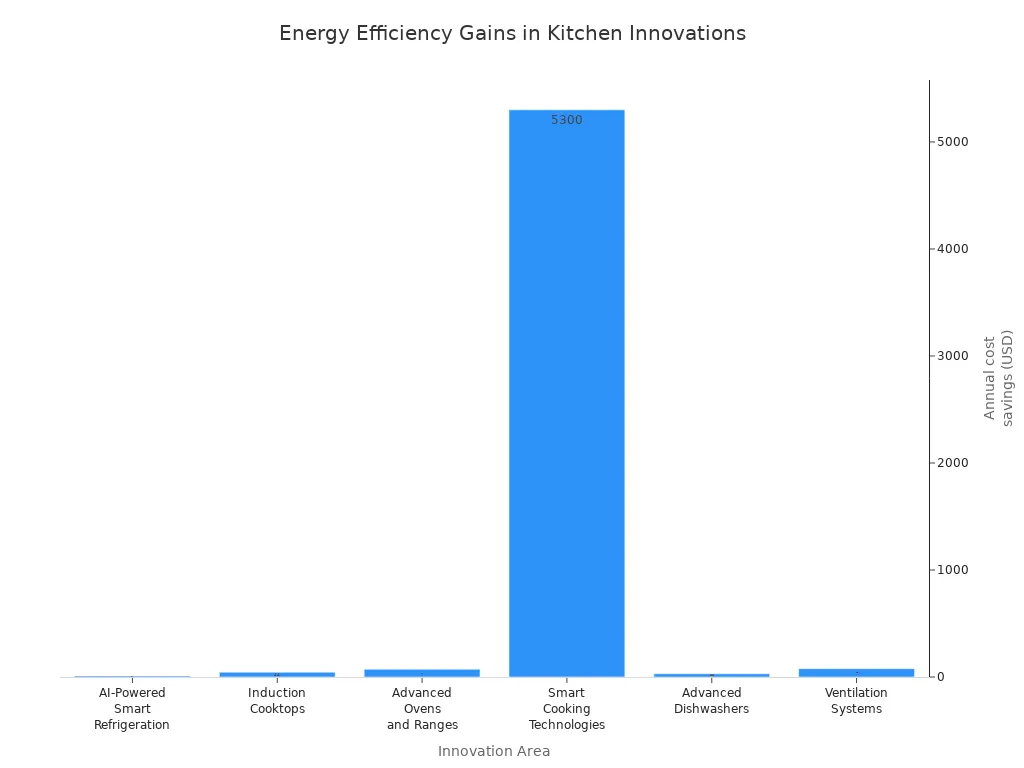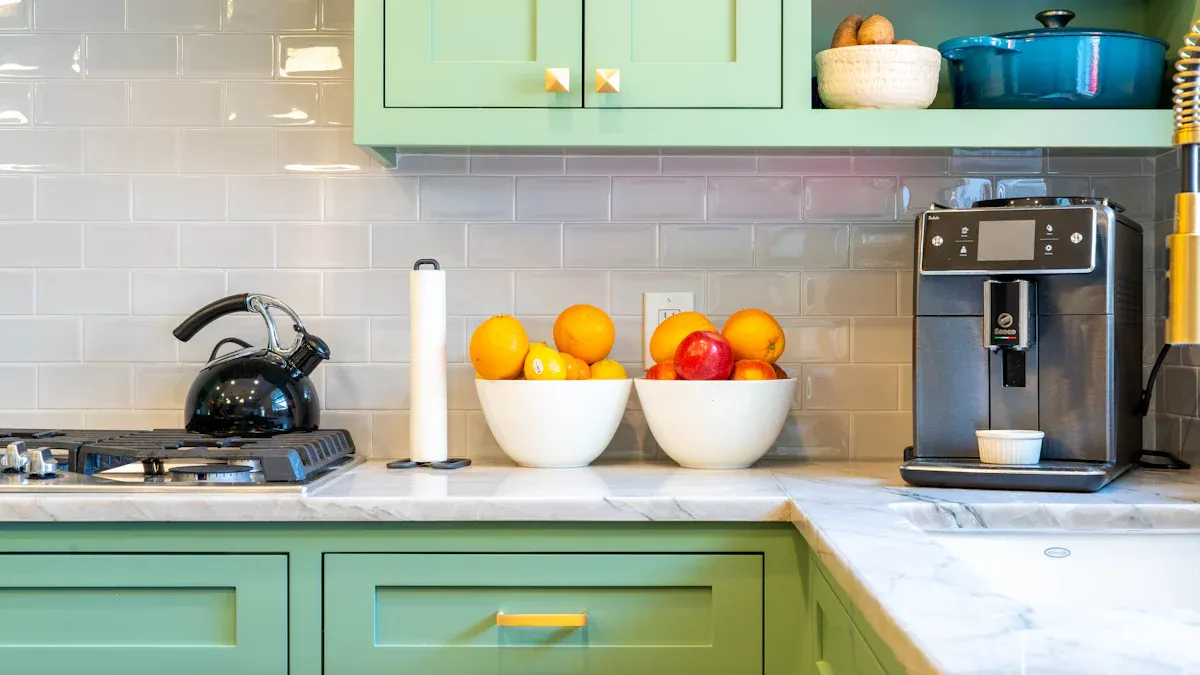
Kitchen appliance brands now compete to deliver essential appliances that help health-focused consumers. Market growth shows rising interest in health and hygiene. Premium kitchen appliances with advanced features saw sales increase by 23% in 2023. Consumers choose brands that support health and wellness through energy-efficient, innovative designs.
Defining Health and Innovation in Kitchen Appliance Brands
What Makes an Appliance Health-Focused?
A health-focused kitchen appliance brand meets strict standards to support better indoor air quality and wellness. These brands often seek certifications that prove their products help people with asthma or allergies. The following criteria define a health-focused appliance:
- Removes over 95% of allergens, such as dust and pollen.
- Maintains safe operational conditions, like keeping water at 130°F for at least 15 minutes in washing machines.
- Avoids harmful emissions, including ozone and volatile organic compounds (VOCs).
- Receives certification from trusted programs, such as the Asthma & Allergy Friendly® Certification Program.
- Aligns with recognized standards like LEED and WELL for added credibility.
Note: Brands like LG use these certifications to show their high-tech focus and commitment to health. Certified appliances include washing machines and air purifiers that improve indoor air quality.
The Role of Innovation in Modern Kitchens
Innovation shapes how kitchen appliances support healthier lifestyles. Brands use modern technology and cutting-edge design to create products that make healthy cooking easier and more enjoyable. For example, Bosch, Tefal, and Cuisinart use digital platforms to show how their appliances help people cook nutritious meals at home. They share quick tutorials, live demonstrations, and influencer partnerships to build trust and show real-life results.
Philips works with culinary experts to blend technology, nutrition, and local food culture. This approach leads to innovative features, such as appliances that encourage seasonal eating and safe, healthy cooking. Advanced technology, like multi-mode temperature drawers in refrigerators, keeps food fresh longer and supports nutritious choices. A well-designed kitchen with modern technology and thoughtful functionality can also improve mental well-being and make cooking a joyful experience.
Top Kitchen Appliance Brands for Healthier Lifestyles
Breville: Precision and Versatility
Breville stands out among kitchen appliance brands for its commitment to health and performance. The company designs juicers and blenders that maximize nutrition from fresh fruits and vegetables. Users can choose between juicing for concentrated vitamins or blending for meal replacements. Breville offers a range of professional-grade appliances, including slow juicers and super blenders, tailored for health-conscious consumers.
- Breville air fryers and convection ovens use premium materials for durability and quality.
- These high-performance appliances reduce oil use, supporting healthier cooking and better health outcomes.
- The Smart Oven Pro provides precise toasting and bagel settings, preventing burning and reducing food waste. Fast preheating preserves nutritional quality and enables quick preparation of wholesome meals.
Breville’s innovative features and functionality help busy families maintain healthy eating habits.
Vitamix: Whole-Food Nutrition Power
Vitamix leads the market with high-end kitchen appliances focused on whole-food nutrition. The company’s timeline of innovation shows a dedication to quality and performance.
| Year | Product/Innovation | Key Features Supporting Whole-Food Nutrition |
|---|---|---|
| 1937 | Vita-Mix | Powerful blender for healthy foods and whole-food nutrition |
| 1950 | Mark 20 | Two speeds for versatile whole-food preparation |
| 1970 | Vita-Mix 3600 | Multiple speeds, forward/reverse blending |
| 1985-88 | Flurry & Vita-Mix 4000 | Commercial-grade, fast and efficient blending |
| 1992 | Total Nutrition Center | 11 speeds, clear container, precise blending |
| 1995 | Timer Blender | Timer for consistent blending and nutrition retention |
| 2012 | Vitamix 7500 (G Series) | Microprocessor control for optimal whole-food blending |
| 2016 | Vitamix Ascent® | SELF-DETECT® smart technology for efficient blending |
Vitamix supports health through blending classes, plant-based recipe newsletters, and the Vitamix Foundation. The company encourages root-to-stem blending, reducing food waste and maximizing nutrition. Appliance features like multiple speeds and microprocessor control optimize blending for better taste and nutrition.
Philips: Air Frying and Low-Oil Cooking
Philips delivers essential appliances that promote health by making air frying accessible. Air fryers from Philips use only a tablespoon of oil, reducing calorie intake by up to 80% compared to deep frying. This cooking method lowers acrylamide formation by up to 90%, decreasing cancer risk. Air frying also produces fewer harmful compounds than traditional frying.
Air fryers support weight management and reduce risks linked to obesity and cardiovascular disease. Philips designs these appliances with safety and performance in mind, offering healthier alternatives for families. The innovative features of Philips air fryers help users prepare meals with less fat and fewer adverse health effects.
Samsung: Smart Kitchens and Nutrition Tracking
Samsung integrates smart technology into its kitchen appliance brands to support health and wellness. The AI Family Hub™+ refrigerator uses AI Vision Inside™ to identify and track food items. Users access inventory lists through the SmartThings app, which sends recipe recommendations based on available ingredients.
- Samsung Food platform connects with Samsung Health and SmartThings, tailoring recipes to dietary needs.
- Recipes display on the fridge and induction range, making multitasking easier.
- The connected ecosystem helps users monitor nutrition, manage food inventory, and receive personalized suggestions.
Samsung’s smart features and functionality enable families to make healthier choices and improve kitchen performance.
Panasonic: Fermentation and Allergen Reduction
Panasonic focuses on health by offering appliances that support fermentation and allergen reduction. The company’s high-performance appliances include bread makers with fermentation settings and air purifiers that remove allergens. Panasonic’s innovative features help users prepare probiotic-rich foods and maintain better indoor air quality. These professional-grade appliances combine quality and functionality for health-conscious consumers.
Ninja: Affordable Health-Driven Solutions
Ninja balances affordability with health-driven features in its product lineup. The brand offers professional-grade appliances with powerful motors and specialized blades for nutrient extraction.
| Specification / Feature | Details |
|---|---|
| Motor Power | 1400 peak watts for effective blending and nutrient extraction |
| Blades | Total Crushing® and Pro Extractor Blades® for smoothies and frozen drinks |
| Capacity | 72 oz. pitcher and 24 oz. single-serve cups for convenience |
| Auto-iQ Technology | Preset blending programs automate pulsing and blending |
| Dishwasher Safe | Components are dishwasher safe for easy cleaning |
| Price Positioning | More affordable than high-end kitchen appliances |
Ninja’s product lineup includes full-size blenders, personal blenders, and systems with food processors. Health-driven features like nutrient extraction and Auto-iQ technology optimize blending programs. Attachments such as dough blades and micro-juicers add versatility and functionality, supporting various health-related food preparations.
Beko: Award-Winning Energy Efficiency
Beko stands out among kitchen appliance brands for its commitment to energy efficiency and health. The company received the ENERGY STAR® Partner of the Year Sustained Excellence Award for three consecutive years. Beko offers 29 products with EPA Most Efficient certification and has earned the EPA’s Emerging Technology Award.
- Beko consistently exceeds ENERGY STAR®, EPA, and DOE requirements.
- The brand sets new standards in sustainability and energy efficiency.
- Innovative features and high-performance appliances help users reduce energy consumption and support a healthier lifestyle.
Miele: Luxury and Eco-Friendly Innovation
Miele combines luxury with eco-friendly innovation in its high-end kitchen appliances. The company builds appliances to last decades, promoting durability and quality. PerfectFresh technology keeps food fresh up to three times longer, reducing waste and supporting health.
- Miele uses recycled materials and resource-friendly production methods.
- Appliances rank among the most energy-efficient in the luxury market.
- Smart technologies like AutoDos detergent dispensing and smartphone controls optimize performance and resource use.
Miele’s innovative features and functionality align with conserving raw materials and reducing carbon footprint.
Kuvings: Juicing and Probiotic Appliances
Kuvings specializes in juicing and probiotic appliances that support health and nutrition. The brand’s high-performance appliances extract juice from fruits and vegetables, preserving vitamins and minerals. Kuvings offers professional-grade appliances with features for making yogurt and fermented foods. These essential appliances help users maintain a balanced diet and improve digestive health.
LG: AI-Driven, Health-Focused Appliances
LG utilizes artificial intelligence to enhance health-focused kitchen appliance brands. The InstaView™ Door-in-Door® Refrigerator uses AI Fresh technology to optimize food preservation and freshness. The advanced AI Inverter™ learns usage patterns, maintains stable temperatures, and reduces cold air loss. These smart features help keep food fresher for longer, supporting healthier storage and minimizing waste.
LG’s appliances follow a human-centric philosophy called ‘Affectionate Intelligence,’ adapting to users’ lifestyles for convenience and comfort. The brand’s innovative features and functionality improve kitchen performance and support health.
Nuwave: Efficient, Healthier Cooking
Nuwave delivers high-performance appliances designed for efficient, healthier cooking. The brand’s ovens and air fryers use advanced technology to reduce oil use and preserve nutritional quality. Nuwave’s professional-grade appliances offer multiple cooking modes, supporting a variety of health-focused meal preparations. The company emphasizes quality and performance, making healthy cooking accessible to more families.
Frigidaire: State-of-the-Art Innovation
Frigidaire sets itself apart with innovative features and state-of-the-art performance. The 5-in-1 Air Fryer Combo offers five cooking functions, including air frying and dehydrating, promoting healthier meals. The Steam Espresso Maker provides barista-quality beverages at home, supporting health-conscious choices.
- Proprietary features like the Custom-Flex® Temp Drawer and CrispSeal® Crispers enhance food preservation and kitchen organization.
- Frigidaire introduced the first home oven in North America capable of reaching 750°F, enabling restaurant-quality pizza in two minutes.
- The multifunctional range offers over 15 cooking modes, such as Air Fry, Air Sous Vide, Steam Bake, and Dehydrate.
Frigidaire’s commitment to quality, performance, and functionality helps families enjoy healthier cooking with advanced technology.
Key Innovations in Energy-Efficient Appliances
Air Frying and Low-Oil Cooking
Air frying stands out as one of the most popular energy-efficient appliances in modern kitchens. This technology uses hot air circulation to cook food, which reduces oil use by up to 70% compared to deep frying. Foods like fries and chicken wings come out crispy with much less fat. Air fryers also lower the formation of harmful compounds such as acrylamide by about 90%. These features help families enjoy favorite meals with fewer calories and less fat, supporting heart health and weight management. Many energy-efficient models now include air frying as a standard feature, making it an energy-efficient option for healthier cooking.
Smart Nutrition Tracking and AI Integration
Smart technology compatibility has transformed kitchen appliances into energy-efficient life savers. Integrating smart technology allows users to track nutrition, plan meals, and receive real-time feedback. AI-powered appliances can connect with wearables and health apps, offering personalized meal plans and reminders. These features improve dietary habits, increase physical activity, and support weight loss. Smart features also help users adjust recipes based on health data, making it easier to stick to wellness goals. The performance of these appliances ensures that healthy choices become part of daily routines.
| Use Case | Impact on Health Outcomes |
|---|---|
| Integration with Wearables & IoT | Faster data processing, early disease detection, reduced medical resource waste |
| Chronic Disease Meal Planning | Personalized plans, better compliance, cost-efficient long-term care |
| AI-Powered Virtual Coaches | Real-time feedback, sustained behavior change, improved health metrics |
Steam Ovens and Sous Vide Technology
Steam ovens and sous vide technology represent major innovation in energy-efficient appliances. Steam ovens use controlled steam and precise temperature to cook food gently, preserving vitamins and minerals. Sous vide technology cooks food in vacuum-sealed bags at low temperatures, which keeps nutrients and flavor locked in. These features prevent nutrient loss and reduce the need for added fats. Steam ovens also reheat food without drying it out, maintaining both taste and nutritional value. Many energy-efficient appliances now combine steam and convection for even better performance.
Allergen Reduction and Air Purification
Modern kitchens benefit from appliances that focus on allergen reduction and air purification. HEPA filters capture up to 99.97% of airborne particles, including dust and pollen. Activated carbon filters remove odors and gases, while PECO technology destroys bacteria, viruses, and allergens at the molecular level. These features work together to create cleaner air and a healthier kitchen environment. Smart sensors monitor air quality and adjust purification levels automatically, making these appliances a top choice for families with allergies.
Multifunctional and Fat-Reducing Ovens
Multifunctional ovens offer a range of features that support healthy cooking. Steam and combination ovens use moist heat to retain nutrients and reduce the need for added oils. Air frying technology in these ovens creates crispy textures without extra fat. These energy-efficient appliances allow users to bake, roast, steam, and air fry in one unit, saving space and energy. The performance of these ovens encourages diverse cooking methods, helping families prepare nutritious meals with less effort.

Eco-Friendly Features in Modern Kitchen Appliance Brands

Sustainable Materials and Design
Many kitchen appliance brands now focus on eco-friendly materials and design. Companies use recycled plastics, stainless steel, and glass to build durable products. These choices help reduce the need for new resources and support sustainability. Some brands, like Dacor, avoid harmful chemicals such as CFCs and HCFCs, making their appliances safer for the environment. Luxury appliances often last longer, which means fewer replacements and less waste. A sustainable kitchen benefits from these long-lasting, thoughtfully designed products.
Reducing Energy Consumption and Waste
Brands work hard to lower energy use and minimize waste. Many appliances carry the Energy Star label, which means they use up to 50% less energy than standard models. LG’s Door-in-Door refrigerator design cuts energy use by up to 47% by keeping cold air inside. Bosch dishwashers save water, while Liebherr appliances help food last longer, reducing food waste. Samsung washing machines use microfiber filters to stop pollution. Induction ranges from Thermador use technology to heat cookware directly, making them more efficient. Sustainable washers use AI to adjust water and energy use for each load, supporting sustainability goals.
- Energy Star-certified appliances lower electricity use and greenhouse gas emissions.
- Low-flow dishwashers use half the water of traditional models and include energy-saving features.
- Many brands design products for durability, reducing waste from frequent replacements.
Smart Appliances for Environmental Impact
Smart technology plays a big role in sustainability. Smart modules can turn regular appliances into smart systems, allowing users to track energy use. Centralized control through apps lets people automate lighting, heating, and appliances, cutting down on wasted energy. Smart ovens and refrigerators use sensors to adjust power based on load size, preventing energy waste. Induction cooktops use electromagnetic energy, which reduces heat loss and saves energy. Some smart appliances connect to solar panels, using renewable energy for daily tasks. Smart thermostats and lighting controls help lower energy bills and carbon footprints. Data-driven ventilation and pollutant tracking improve indoor air quality and support a healthier, more sustainable kitchen.
Tip: Choosing Energy Star-certified and smart appliances helps families save money and protect the environment.
How to Choose the Right Kitchen Appliance Brand for Your Health Goals
Matching Brand Strengths to Personal Wellness Needs
Every health-focused consumer has unique goals. Some want appliances that support nutrition, while others look for features that improve air quality or reduce allergens. Brands offer different strengths. For example, some brands focus on energy efficiency, while others highlight advanced technology or easy-to-use designs. Consumers often trust brands with a history of quality and reliable performance. Recommendations from friends or positive reviews can also influence choices.
- Convenience and efficiency help simplify daily routines.
- Health and safety features, such as air quality monitoring, are important for families.
- Technological innovations, like AI personalization, improve user experience.
- Demographic factors shape preferences. Younger people may prefer innovation, while older adults value reliability and ease of use.
Tip: Reading consumer feedback and considering cultural needs can help match a brand’s strengths to personal wellness goals.
Considering Budget, Space, and Lifestyle
Budget, kitchen space, and lifestyle play a big role in choosing appliances. Price sensitivity affects how much someone will pay for advanced features. Many people now look for energy-efficient appliances to save money and help the environment. Product availability and customer service also matter when making a decision.
- Energy efficiency and sustainability are major considerations.
- Government standards can affect appliance design and choices.
- Supply chain issues may influence which brands are available.
- Superior customer experience and product availability build loyalty.
A good choice balances quality, functionality, and cost. Health-focused consumers should look for appliances that fit their space and daily habits, while also supporting their health and wellness journey.
- Kitchen appliance brands now offer healthier, smarter, and greener choices.
- Shoppers should compare brand reputations and health features before buying.
- Energy-efficient appliances help families live better and protect the planet.
Smart choices in the kitchen support a healthier and more sustainable lifestyle.
FAQ
What features make a kitchen appliance healthier?
A health-focused appliance uses less oil, preserves nutrients, and reduces allergens. Many brands add smart features for better food storage and cooking.
How do energy-efficient appliances help families?
Energy-efficient appliances lower electricity bills and reduce waste. They also help protect the environment by using less power and water.
Can smart kitchen appliances improve nutrition?
Yes. Smart appliances track food, suggest healthy recipes, and help manage portions. These features support better eating habits and nutrition.


